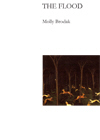The Flood
One doesn’t have to know Paolo Uccello and his paintings to appreciate the quiet, lingering poems of Molly Brodak’s chapbook The Flood, a series of poems transfixed upon Uccello’s little-known life and works. Breathing life into Uccello through a distinct voice as well as elucidating his paintings through ekphrastic and descriptive poems, The Flood provides a concentrated illumination of how the written word can interact with and respond to visual representation.
One doesn’t have to know Paolo Uccello and his paintings to appreciate the quiet, lingering poems of Molly Brodak’s chapbook The Flood, a series of poems transfixed upon Uccello’s little-known life and works. Breathing life into Uccello through a distinct voice as well as elucidating his paintings through ekphrastic and descriptive poems, The Flood provides a concentrated illumination of how the written word can interact with and respond to visual representation.
While lyrical and visually spare, poems voicing Uccello highlight fragments of his biography. Before the artist speaks, however, “Awful Paolo” details the words of a critic who calls the painter a “half artist,” elaborating: “half-eaten by perspective, his pet machine, / existing halfwise in cramped breathing, / with lime-burned palmed and powder gestures.”
In “Barber Surgeon Father,” five spaced lines, some complete and other fragmented, dwell on a blade’s sharpness, ending with the address “I’m telling you, universe, // I shouldn’t say I knew you.” The speaker continues to play with language in “Said So,” claiming “I had to hate my hand to rot. But brains bash, // and cope without a second thought / and caught without a slot to talk, new words grew.” With each of these poems, this strong voice interacts with representation through language and painting.
Alongside poems illustrating the artist, and perhaps more plentiful, are ekphrastic and descriptive poems that detail some of Uccello’s paintings and the process of painting itself. “A painting is whether you can finish it,” claims the speaker in “Detail,” expanding on the minute details that comprise each painting, until finally concluding that “There is no answer: / a hundred leaves stand in for a million, in suspense, / in ferocious grids, begun long before you looked.” The speaker begins to comment upon Uccello’s depiction of a monastery in “Scenes of Monastic Life”:
Cyan walls recede into gestures,
unconscious gorges, painted in colors he knew people hated.
Like cadet blue, incisor yellow, which is to say he had Ethics;
he had one intelligible hand and one injured hand.
In one language and out the other.
In trying to discern the painting’s meaning, the speaker tries to reckon with words, with description, while figuring out how to render each detail in the painting with the limited arsenal of language.
Tightly crafted and engaged fully in how language functions to give voice to art, The Flood’s eighteen poems flesh out Uccello’s work and life. Brodak’s thorough and careful attention to the minute yet greatly underestimated makes this chapbook an engaging, thoughtful reflection on how all art forms interact and respond to one another.





